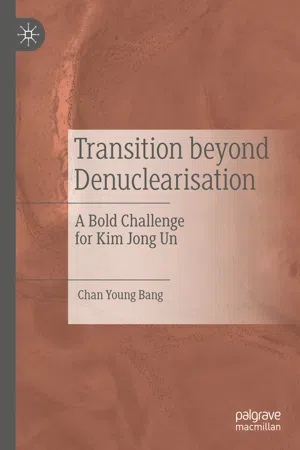1 Author’s Qualifications and Rationale for the Book
This book addresses the issue of North Korea’s survival as a denuclearized, pacified and economically viable state, should the leader of the Democratic People’s Republic of Korea (DPRK ), Kim Jong Un, make the bold and audacious decision to abandon the current nuclear weapons program.
Built upon my analytical reasoning and intensive research over the past several decades, this book takes a genuine approach in the aspect that its main purpose is to put forth strategic solutions for the survival of the DPRK after denuclearization, while previous research on the DPRK has taken a one-sided approach, focusing too narrowly on how the application of threat could coerce the regime to denuclearize. I take a different approach.
In my research, “survival” means more than the mere continuation of the regime; it signifies dynamic, sustained economic development and prosperity through the drive for modernization. I have approached the task of writing this book driven by both personal and professional motivations, and I am fortunate in that both my personal background and my professional experience as an academic and a policy advisor to the first President of Kazakhstan, Nursultan Nazarbayev, have endowed me with what I consider to be a unique perspective on the North Korean conundrum.
Born and raised on the Ongjin Peninsula, present-day North Korea, I was a teenager when the Korean War broke out in 1950, wreaking havoc upon my homeland and family. My father was a medical doctor who owned and operated a hospital; he devoted himself to treating the torrent of war victims who came flooding through his doors.
Before being evacuated together with part of my family in 1951, I personally witnessed the horrendous devastation of this fratricidal conflict, and I have lived with the knowledge that my close relatives toil under direct communist (that is, North Korean) rule. My family suffered several deaths by execution at the hands of the North Koreans. Upon my return to Ongjin after the end of armed conflict, I found my childhood home sequestered by the socialist party and my family members victim to utter desolation, having fallen seriously ill or otherwise executed by the state.
Naturally, the fact of being born in present-day North Korea does not automatically qualify me for the task of writing a book; this is why I rely on my own education and professional experience to assert throughout this book that I consider my vision for the future of North Korea as something unique, not found elsewhere in the literature about the DPRK.
I received my first three university degrees (a B.A. in History, 1954–1958, a second B.A. in Political Science, 1958–1960 and an M.A. in Economics, 1960–1964) at Yonsei University in Seoul. Later, I obtained an M.A. in Economics, 1968–1970 from University of Nevada, and finally a Ph.D. in Economics, 1977 at the University of Colorado.
During the late 1970s and the 1980s, I taught at UCLA and was fortunate enough to focus my research and lectures on economic transitions. I coupled this academic effort with more pragmatic endeavors, organizing numerous seminars and conferences that attracted the interest of economists and policymakers from both camps in the old war era. I served as Executive Director of the Research Institute of Asian/Pacific Studies at the University of San Francisco (1978–1988) then a Visiting Professor at the Institute of Economic Research at Hanyang University (1988–1989) before I became the Chief Economic Advisor to the first President of the Republic of Kazakhstan (1991–1993).
I received numerous invitations from the then Soviet Union during the late 1980s and early 1990s, as high-ranking members of the communist party wanted to gain insights into the strategic implications of security issues in Northeast Asia and, later, the dynamics of economic reform and transition.
Through my work, I met with numerous world leaders, such as former U.S. President George Bush Sr., U.K. Prime Minister Margaret Thatcher, Singapore’s Prime Minister Lee Kuan Yew, U.S. Secretary of State James Baker, and the first Russian President, Boris Yeltsin. Of particular relevance to my work in this book is my direct experience with Mikhail Gorbachev, when he was still leading the Soviet Union, and my meetings with North Korean officials in China during the late 1990s. On both occasions, I came to the conclusion that blind attachment to the ideological, dogmatic principles of socialism was the main impediment to both Gorbachev and the North Korean elite to embracing a new set of ideas, a much-needed policy of radical reform and opening. Gorbachev wished to be remembered, in his own words to me, as a “dedicated communist” who refused to dismantle the socialist ideological implant.
As for the North Korean officials, I met with members of the inner circle during the rule of former leader Kim Jong Il and did my best to rely on an honest, if tough, account of reality: at that time, the DPRK was on its knees, crippled by the famine of the Arduous March, which claimed the lives of nearly a million people (according to most estimates). I was frank and honest in prescribing that the regime should initiate a series of crucial, market-oriented reforms accompanied by opening of the economy. This would require a paradigm change and removal of the mandate stemming from Kim Il Sung, transferring Kim Jong Il’s source of legitimacy to the popular support of the people, garnered through rapid modernization. Additionally, I explained that, in order to override any destabilizing effects of opening, the regime would have to achieve spectacular, unprecedented growth, which would only be possible with the provision of a tremendous economic development fund.
The North Koreans did not receive my proposa...
